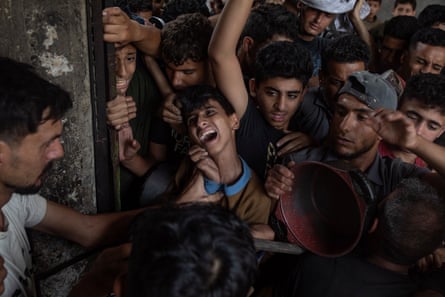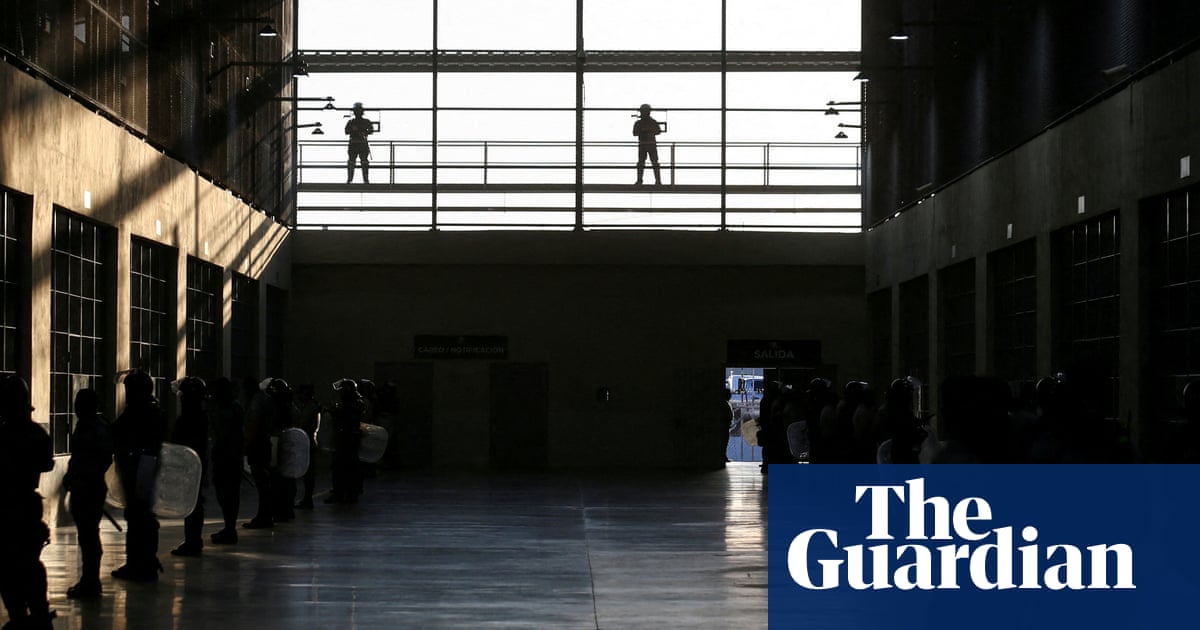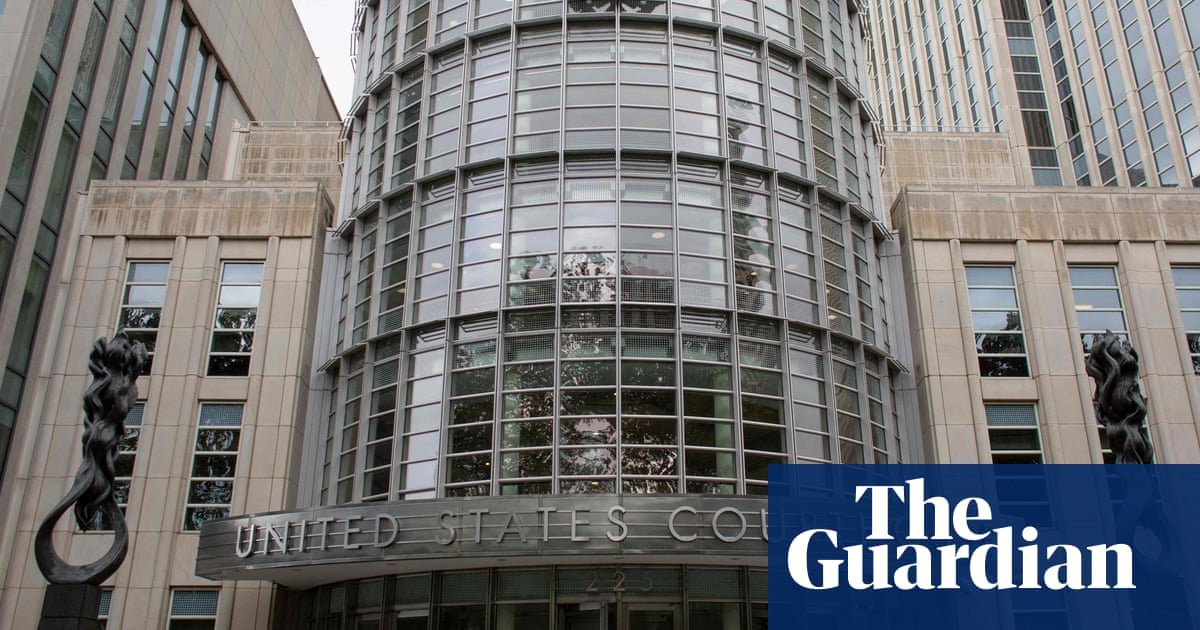I sat this week with Hussein Agha, a man who has given his working life to seeking peace between Israelis and Palestinians, negotiating from the Palestinian side of the table. He was gloomier than I have ever seen him, adamant that peace between the two sides can never, ever come. Because, Agha explained, this conflict was not about mere lines on a map or forms of words, the goods in which diplomats trade. This was about emotions, and specifically hatreds. Hatreds that, he feared, are becoming too murderous to contain. “It’s biblical,” he said.
What he had in mind was the fury that drove Hamas to slaughter around 1,200 Israelis on a sleepy Saturday morning nearly 20 months ago and the fury that has driven the government of Benjamin Netanyahu to bombard Gaza ever since, killing more than 50,000, according to the Hamas-controlled health ministry, and, over the last 80 days, denying food to those who remain. He fears that the hatreds that fuelled these events, and that are fuelled by them, will grow larger and more venomous until nothing and no one is left. The whole land shall be laid waste and made desolate.
A biblical rage is one that devours all reason. It is blinding. It prevents those who are gripped by it from seeing anything other than their own side. It prevents them holding two apparently opposed thoughts in their minds, even when both are true. Take, as an example, two statements we can make about the events of this week.
Israel’s use of hunger as a weapon of war, keeping humanitarian aid out of Gaza for some 11 weeks, is a morally indefensible act that has, rightly, outraged the world. The partial lifting of the blockade supplies the tiniest fraction of what is needed and represents, by Netanyahu’s own admission, the “minimal” amount he can get away with to keep US political support. That is a fact.

The deadly assault on the Capital Jewish Museum in Washington DC on Wednesday night was a morally indefensible act that left two young people dead. The pair were staffers at the Israeli embassy, but all the evidence suggests they were struck at random. Even if he was heard chanting “Free Palestine” or “I did it for Gaza”, the gunman’s target was a Jewish institution filled with Jews. That makes it an antisemitic act. That too is a fact.
And yet, people struggle to hold both facts at once. They fear that by acknowledging one, they will somehow weaken the force of the other. Some seized on the killings in Washington to downplay the killings in Gaza; others did the reverse.
In the first category were those who used the deaths of Yaron Lischinsky and Sarah Milgrim to argue that even to speak about the agony currently inflicted on Gaza by Israel is to incite terrorism. That was the move made by Netanyahu himself, a man never slow to exploit Jewish suffering for his own narrow political purposes. Earlier in the week, France, Canada and the UK had joined together to denounce Israel’s escalating offensive in Gaza and especially its policy of hunger, described in March by Israel’s defence minister as one of the country’s “main pressure levers” against Hamas. The shootings in DC gave Netanyahu an opening to hit back.
“I say to President Macron, Prime Minister Carney and Prime Minister Starmer, when mass murderers, rapists, baby killers and kidnappers thank you, you’re on the wrong side of justice,” the Israeli PM said, before deploying a phrase once favoured by the left: “You’re on the wrong side of history.”

His argument amounts to the claim, often made, that those who draw attention to the consequences of Israeli policy are guilty of “delegitimising” Israel. It does not occur to Netanyahu or his allies that what might undermine Israeli legitimacy in the eyes of a watching world is not the condemnation of Israel’s actions, or the reporting of them, but the actions themselves.
Again, two statements, apparently in tension, can be true at the same time. Journalists who this week demanded that Israel and Egypt make Gaza accessible to international news organisations were right to do so: the facts need to be known. Those facts, once known, may well drive people into a state of rage – even murderous rage – which is why they have to be handled with scrupulous care.
And so, the UN humanitarian chief, Tom Fletcher, has been right to be clear and full-throated in his demands for Israel to let food and medicine into Gaza, but was wrong to suggest that 14,000 babies in Gaza would die within 48 hours – a statement that later had to be corrected, because that warning applied to what would happen if the state of siege was maintained not for another 48 hours, but for a full year. Grave enough, but not the same. Deep and lethal hatreds are at work here; people can be stirred to violence very easily. There is little room to be casual.
I would say the same of Yair Golan, a former general and now leader of Israel’s opposition Democrats party. He deserves credit for demanding Israelis face up to and look hard at what so many prefer not to see. This week he warned, “Israel is on the way to becoming a pariah state, like South Africa was, if we don’t return to acting like a sane country,” adding that “a sane country does not fight against civilians, does not kill babies as a hobby, and does not give itself the aim of expelling populations.” That reference to baby-killing, the use of the word “hobby”, immediately allowed his critics to say he was reviving the antisemitic blood libel that cast Jews as the ritual slayers of Christian children.
This whole terrain is perilous and has to be navigated with great care, whether from within the conflict or without – and, again, that means realising that two things can be true at once. Yes, it’s true that anti-Zionism is not always antisemitic. But that doesn’t mean it’s never antisemitic. Gary Lineker thought he was posting an anti-Zionist video. He failed to see it came attached to antisemitic imagery, in the form of a rat, a favourite Nazi shorthand for Jew.
That episode was a reminder that, much as we might want these categories to be neat and hermetically sealed – “Zionism” over here and fair game for attack; “Jews” over there and protected by anti-racism – the boundary between them is blurred and porous. A man in Washington was angry with Israel and it was a Jewish museum that ended up under deadly fire.
There are countless distinctions like that to be made; complex, apparently contradictory statements to be held in mind all at the same time. But it’s impossible to see them when blinded by a rage and loathing that will not be quelled, when blinded by mutual hatred of biblical proportions. Agha no longer likes to speak in terms of peace or resolving the conflict, but rather of more modest “arrangements” that might keep these furies in check. Either way, one way or the other, this needs to end.
-
Jonathan Freedland is a Guardian columnist
-
Do you have an opinion on the issues raised in this article? If you would like to submit a response of up to 300 words by email to be considered for publication in our letters section, please click here.

 6 hours ago
1
6 hours ago
1

















































